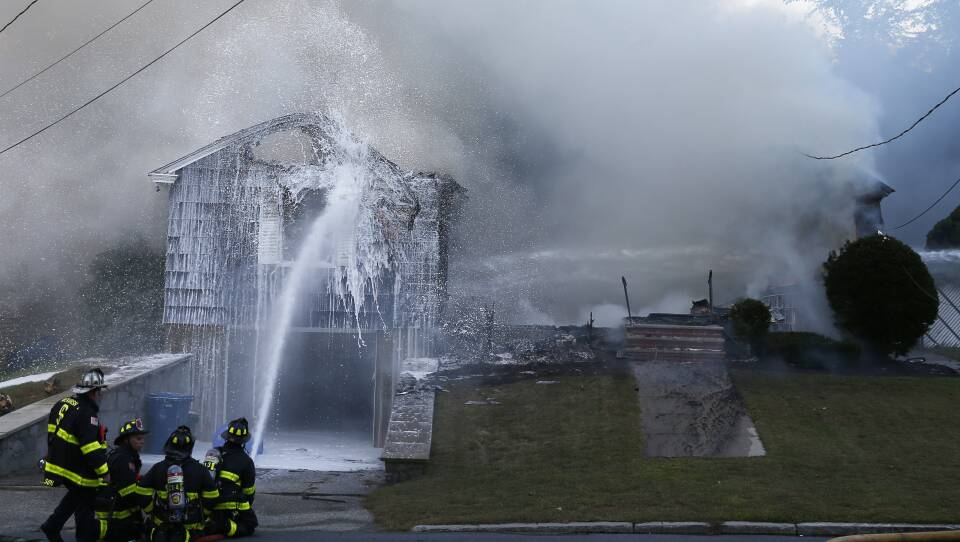There are still more questions than answers when it comes to those explosions and gas fires that forced the evacuation of thousands of Merrimack Valley residents last week. That incident left one man dead, and it's left still thousands of families without heat or hot water. Investigators are continuing to look into what happened. WGBH Radio’s Isaiah Thompson has been following the developments. He spoke with WGBH All Things Considered anchor Barbara Howard about his reporting on Columbia Gas. The following transcript has been edited for clarity.
Barbara Howard: What we learned recently is that Columbia Gas in Massachusetts has been fined by the state for various violations in the past. What have you found out that's new?
Isaiah Thompson: I started looking at federal data from FEMSA — the Federal Pipeline and Hazardous Materials Safety Administration. And I was able to look at a lot of details of past incident, and some of them were big, some of them were small, involving Columbia Gas of Massachusetts, in which it reported releases. And these are since 2010. Some were ignitions, two were explosions. The thing that I found was that in a number of these instances, Columbia Gas of Massachusetts and its sister companies in other states have been significantly late in reporting these things to the proper federal authorities, as required by federal guidelines. When these things happen, they have to be reported not just to the fire department and local officials, but to something called the National Response Center. That's federal, like a clearinghouse for emergency responses. And in several cases, these reports were made way late to that agency.
Howard: Can you give some examples?
Thompson: Yes, I can. So the rule is, you're really supposed to report these immediately, and certainly within one hour if it's a very serious incident. If it's not so serious, you can go up to 12 hours. But the rule of thumb is report them immediately. So what I found was in 2012, for example, there was a fire involving a truck hitting a Columbia gas line. Columbia Gas didn't report that for over 126 hours. In 2015, there were three releases in about two weeks. One was an explosion. Columbia did call the local fire department, but it didn't notify the federal authorities for more than a month in each case.
Howard: Do we know whether Columbia Gas of Massachusetts reported this one, the Merrimack Valley explosions, as they were supposed to, in a timely way?
Thompson: I did review the call logs to the center, and certainly the call center was notified this time in a timely way, it appears, by Columbia Gas — although unfortunately the data didn't say, and I wasn't able to get a spokesperson for the company to confirm that. It appears that they did notify the federal authorities in a timely way this time.
Howard: When you say timely, do you mean within an hour?
Thompson: Yeah, within about an hour, it seems.
Howard: You didn't just look at Columbia Gas of Massachusetts, you looked at other gas companies owned by NiSource. That's the parent company of Columbia Gas. You found a pattern?
Thompson: I did. The pattern, in short, is that if you look at all of the different NiSource companies in Ohio, in Pennsylvania, in Virginia, in Indiana — they were all, on average, significantly late in reporting these things, much later than most other gas companies across the country, when it came to reporting to the federal authorities.
I talked to an attorney, Michael Berg, who's represented a lot of victims of gas explosions. Full disclosure, he is beginning to represent some of the victims of this incident here in the Merrimack Valley, But he explained why this federal reporting is really so important.
Sound from Attorney Michael Berg
Number one, it puts everybody on notice — the government, puts them on notice that there's a problem here and that problem needs to be rectified right away. And you know waiting two weeks, three weeks, it does not allow the government and the Department of Transportation to get involved right away.
Howard: Now I've heard also that Elizabeth Warren and Ed Markey, our two senators, are looking into this, right?
Thompson: Yeah, Senators Warren and Markey put out a letter that’s essentially a list of questions to the proper federal authorities who are beginning to look into this. One of the prominent questions in that letter was whether Columbia Gas responded to the National Federal Response Center in a timely way and what happened with that. They’re looking for answers to that question and I think we'll get some.
Howard: I understand Markey and Warren have also sent a letter not just to the federal authorities, but to Columbia Gas demanding answers. Thanks so much, Isaiah.
Thompson: Thank you, Barbara.
Howard: That's WGBH Radio’s Isaiah Thompson, giving us an update on the situation with Columbia Gas and the fires and explosions in the Merrimack Valley last week that are tied to that company. This is WGBH’s All Things Considered.




